Rugged Ridge Grows Sugarbush, Business in Pace with the Forest
March 09, 2021
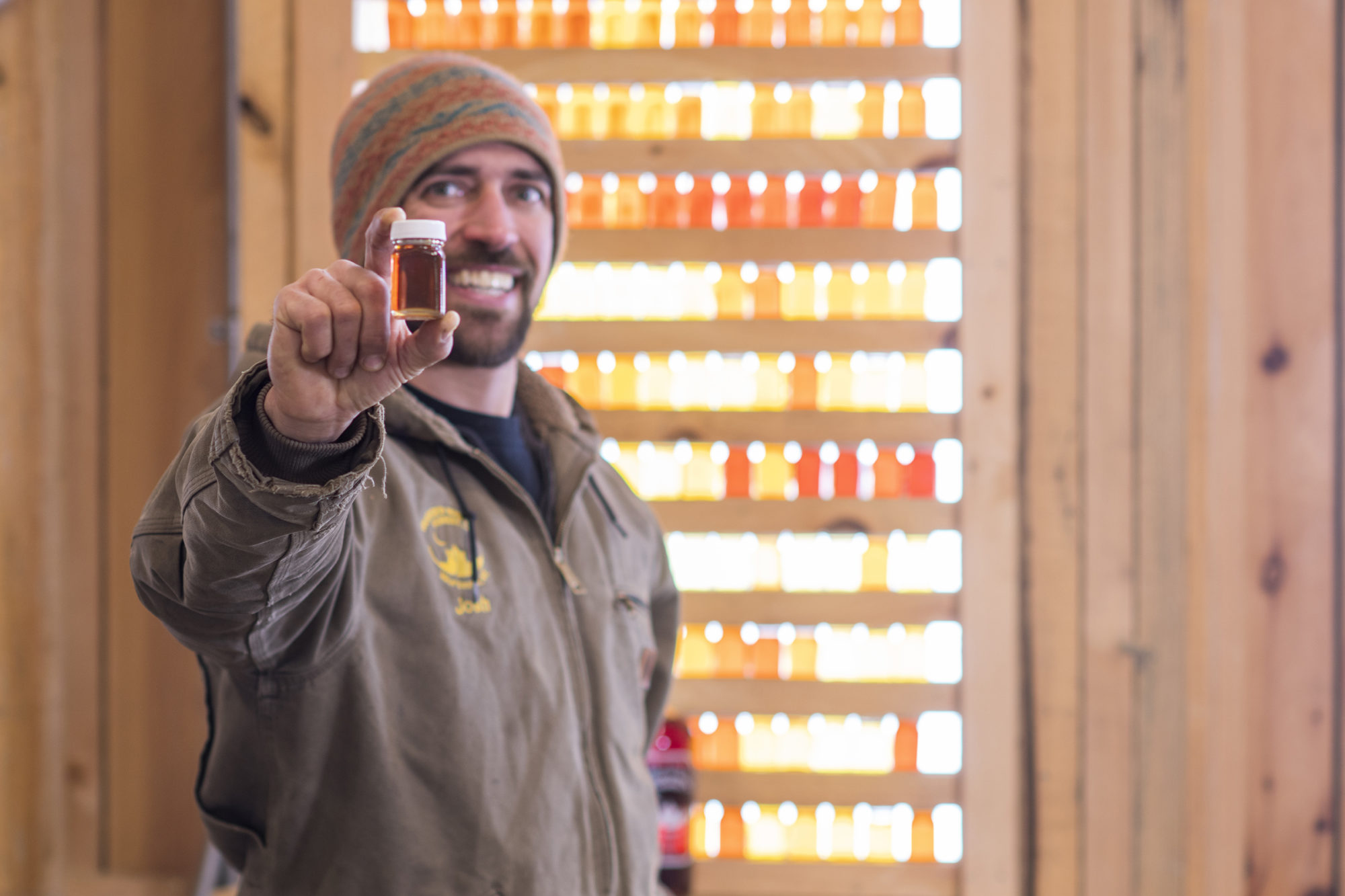
By Christine McGowan, Forest Products Program Director at Vermont Sustainable Jobs Fund
It’s often said in business that “bigger is better,” but for Josh Seidman, steward of Rugged Ridge Forest, “better” is making the highest-quality maple syrup sustainably.
A 2010 University of Vermont graduate, Seidman became interested in forestry after taking a small woodlot management class with Michael Snyder, Vermont’s Commissioner of Forests, Parks and Recreation. “I took the class for fun,” said Seidman, “but was fascinated by the intersection of ecology and the economy.” The class inspired Seidman to pursue a major, and ultimately a career, in forestry.
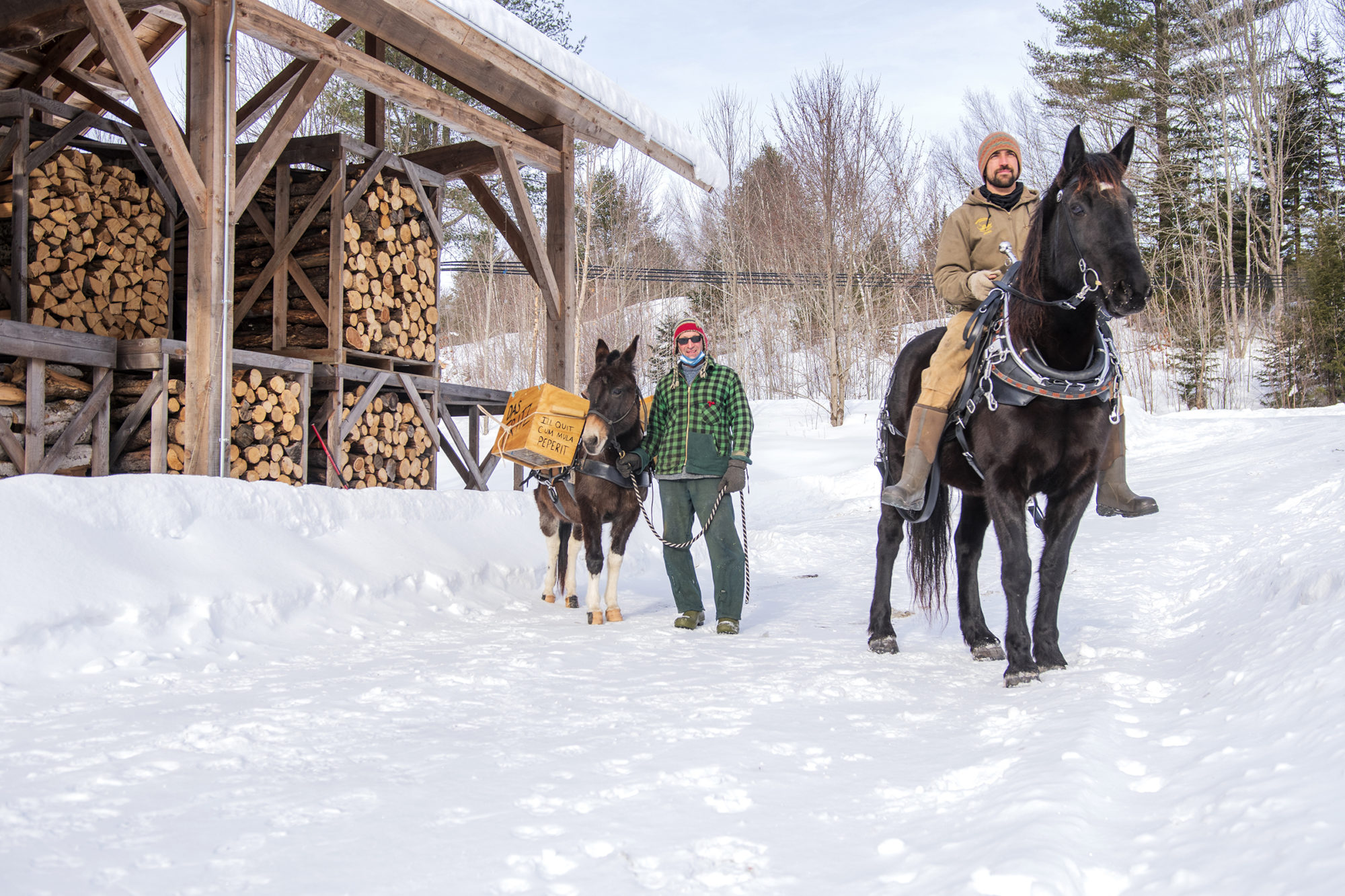
Josh Seidman and Paul Ruta head out to go logging with Hilde, a percheron cross, and Fritz, a mule. Photo by Erica Houskeeper.
Wood-fired for taste, tradition.
Classic forestry jobs, however, were not easy to come by, so Seidman narrowed in on the maple syrup industry—a sweet spot in Vermont’s economy with steady growth projections. After working for both a large producer and a small, family operation, Seidman decided to start his own business. He purchased land in Worcester the winter of 2014 and, not wanting to miss a sugaring season, hung 50 buckets that spring. Determined to combine the best of modern and traditional techniques, he built his sugarhouse around a wood-fired boiler, which he believes produces a more traditional tasting maple syrup.
As the industry has modernized, many producers have moved to steam evaporators, which are fuel efficient and keep sap boiling at a controlled low temperature. But Seidman missed the deep, complex flavor of the syrup he had helped produce on a friend’s family farm during college, which was boiled over a wood fire.
“It was magic,” he said. “The crackle of the fire that sears your skin when you opened the arch door, the heaps of wood harvested from a few hundred yards away, the warmth of the shack after a long, cold winter, and that smell!”
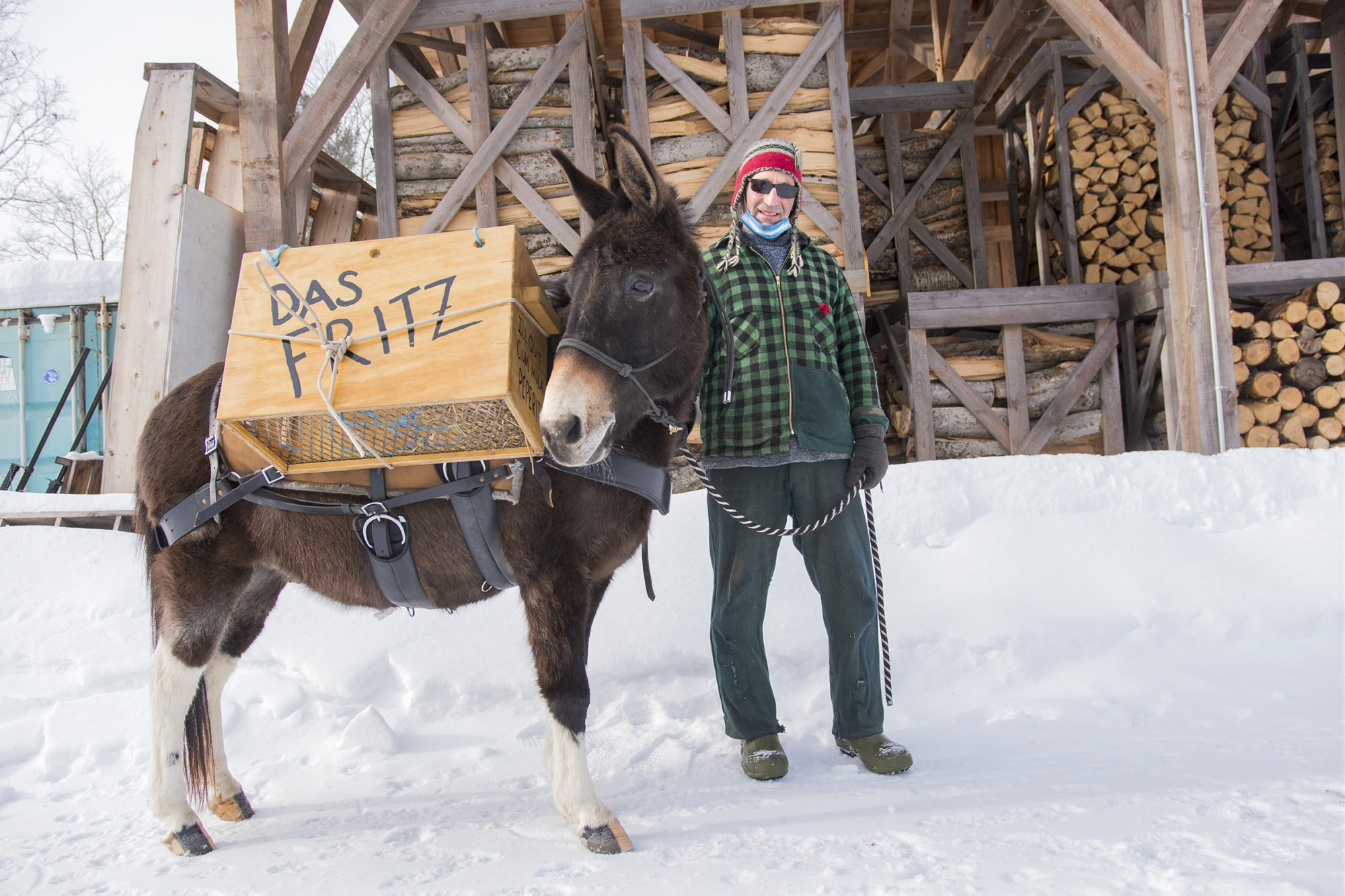
Paul Ruta and Fritz get ready to log in the woods at Rugged Ridge Forest in Worcester. Photo by Erica Houskeeper.
But, for Seidman, it was really about taste and the caramelization that happens over higher temperatures, which produces a darker syrup and more traditional maple flavor.
Seidman talks about maple syrup the way a connoisseur would describe a fine wine. “Small volumes of smoke get caught in vortexes of steam and kiss the surface of the syrup, imparting an extremely subtle, yet delicious smokiness to the syrup, increasing the complexity of its flavor and setting wood-fired syrup apart from the other methods,” he writes on his website. “It is not overwhelmingly smokey, but very mapley, complex, and delicious.”
Business plan meets forest plan.
Boiling sap over a wood fire also dovetails nicely with Seidman’s forest management plan, which calls for the harvesting of dead and decaying beech trees on the property. That harvest, which is used to fuel the sugaring operation, allows Seidman to slowly steer his forest toward a larger sugarbush by creating space for smaller maples to thrive.
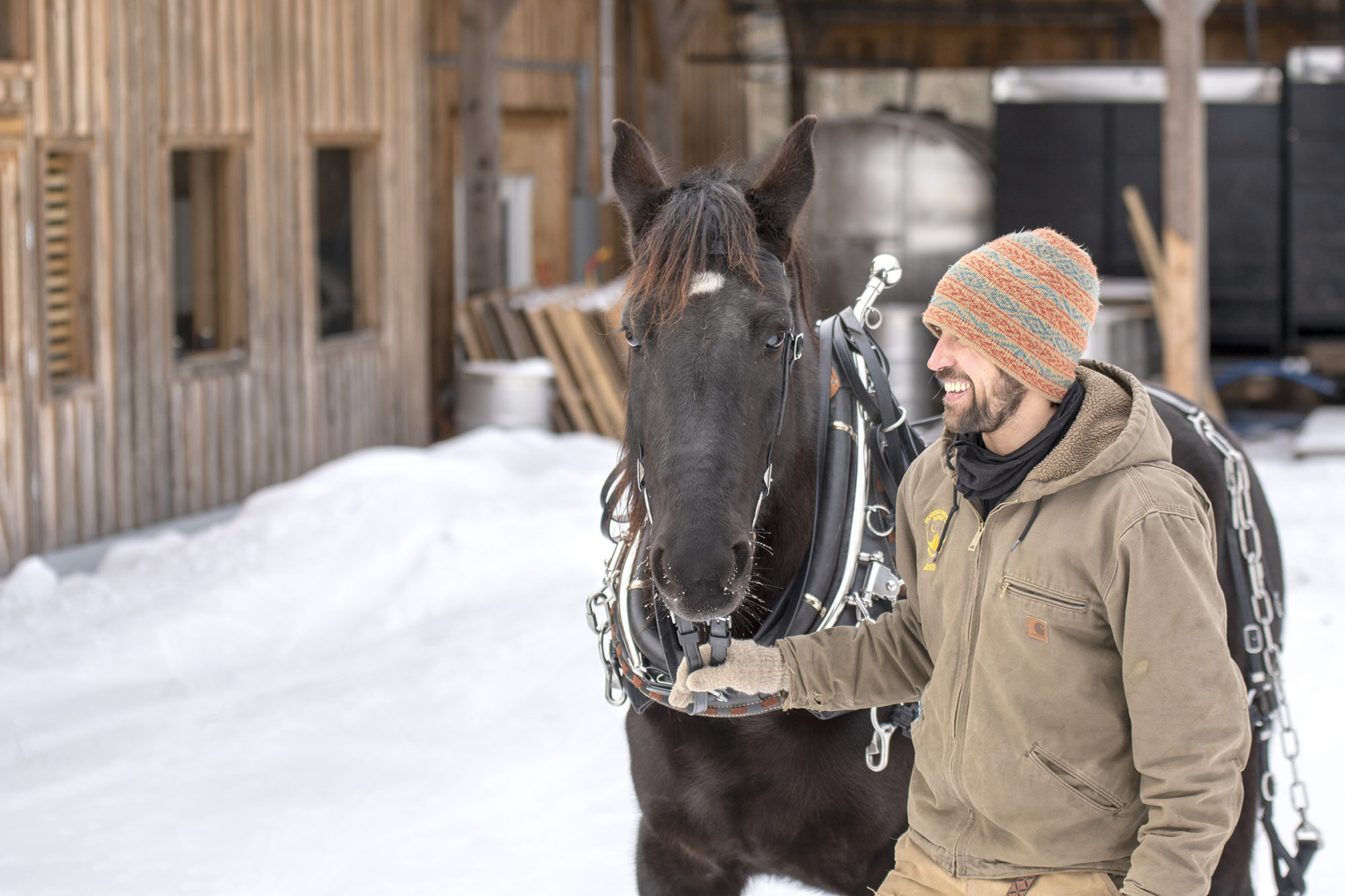
Josh Seidman gets ready to ride his horse, Hilde, into the woods in Worcester. Photo by Erica Houskeeper.
Building on those first 50 buckets, Seidman has added a couple thousand taps a year, growing slowly to avoid big, costly mistakes and learn along the way. Growth at this pace also allows Seidman and his team to manage the forest for multiple objectives, including wildlife habitat and a fledgling network of running and cross-country skiing trails.
“The land had been pretty neglected over the years,” said Seidman. “It still needs a lot of work. We have a one- and ten-year plan, as well as the 100-year dream.” His plans prioritize creating a healthy sugarbush within a diverse forest, with varying species composition and age classes that create habitat for wildlife and improve resistance to pathogens. He is also laying out a new network of log roads and trails, all of which are carefully designed for minimal impact on water and soil erosion.
Seidman’s commitment to tradition holds true in his forest management as well as his sugaring operation. Although he does own a skidder and a chainsaw, Seidman is just as likely to be out logging with his mule, Fritz, and percheron cross, Hilde. “Working with horses is just plain cool,” he said, “and preserving that tradition is an important value of ours.”
Either way, he is meticulous about how he harvests, and careful to protect the high value wood on the land. “That’s the great thing about logging in a sugarbush,” he says, “the value is not in what you take, it’s in what you leave behind.”
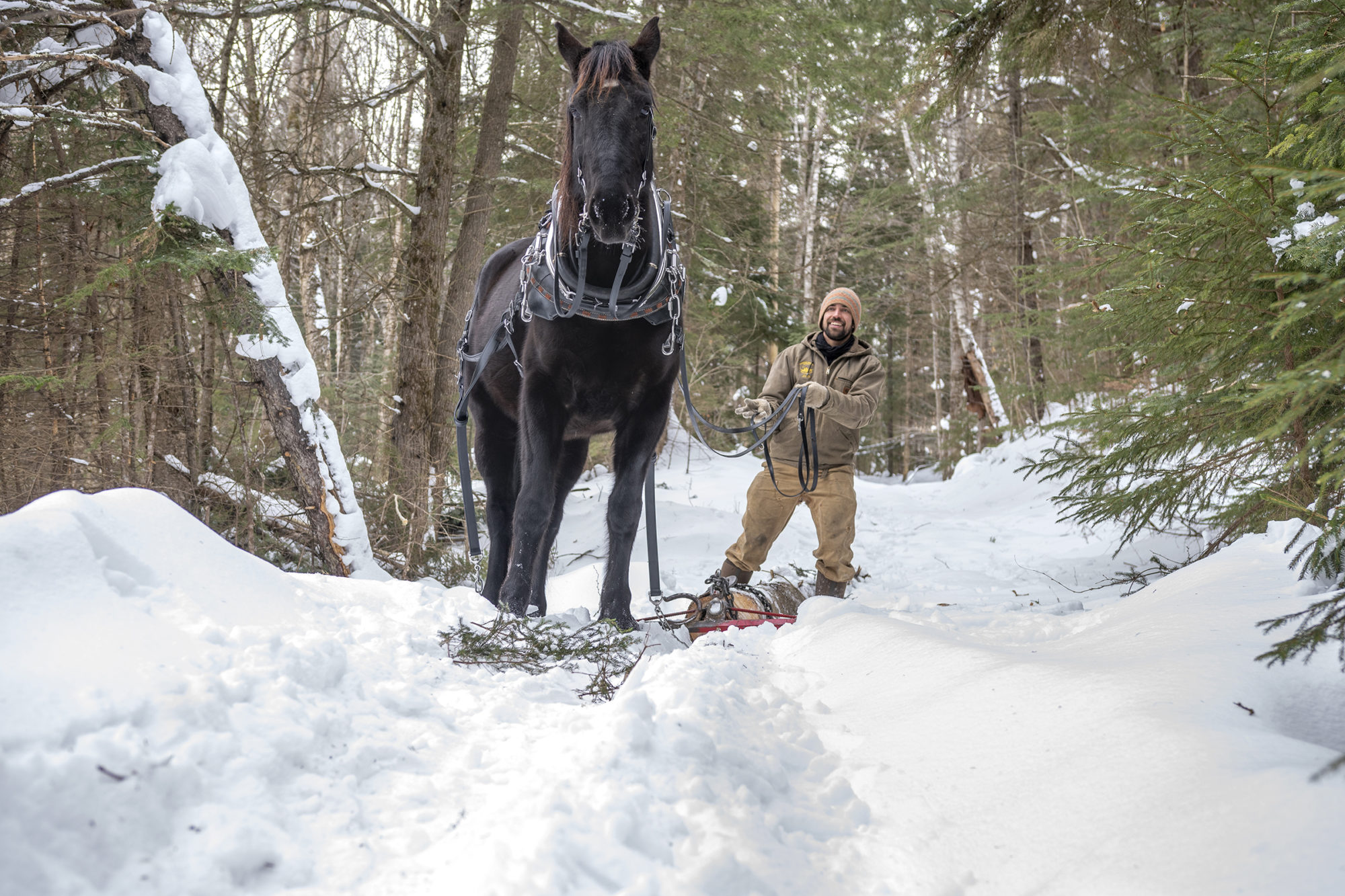
Josh Seidman, and his horse, Hilde, get ready to drag a log down from the woods in Worcester. “Working with horses is just plain cool,” he said, “and preserving that tradition is an important value of ours.” Photo by Erica Houskeeper.
About the Vermont Forest Industry Network
Vermont’s forest products industry generates an annual economic output of $1.4 billion and supports 10,500 jobs in forestry, logging, processing, specialty woodworking, construction and wood heating. Forest-based recreation adds an additional $1.9 billion and 10,000 jobs to Vermont’s economy. The Vermont Forest Industry Network creates the space for industry professionals from across the entire supply chain and trade association partners throughout the state to build stronger relationships and collaboration throughout the industry, including helping to promote new and existing markets for Vermont wood products, from high-quality furniture to construction material to thermal biomass products such as chips and pellets. Learn more or join at www.vsjf.org.
Read More Stories Like This:
- Combined Heat and Power at Allard Lumber Saves Money, Jobs, and Environment
- Wood Curl Packaging Reduces Waste, Supports Healthy Forests and Local Economy
- Maple Landmark, America’s “Local Toy Company,” Rooted in Family, Forest
- Loggers and Lagers: How Healthy Forests Help Brew a Better Pint
- Vermont’s Lafoe Logging Named Northeast Region “Outstanding Logger”




